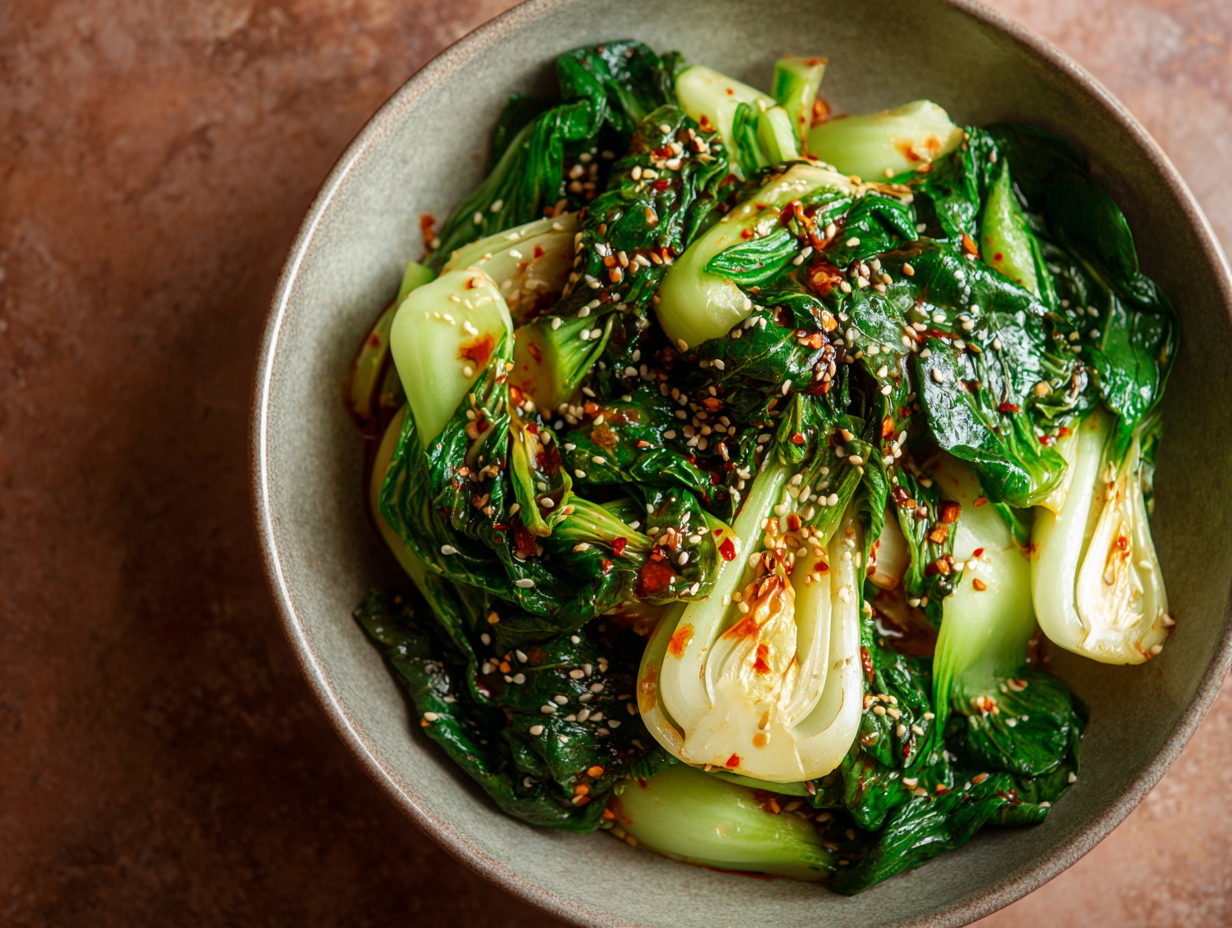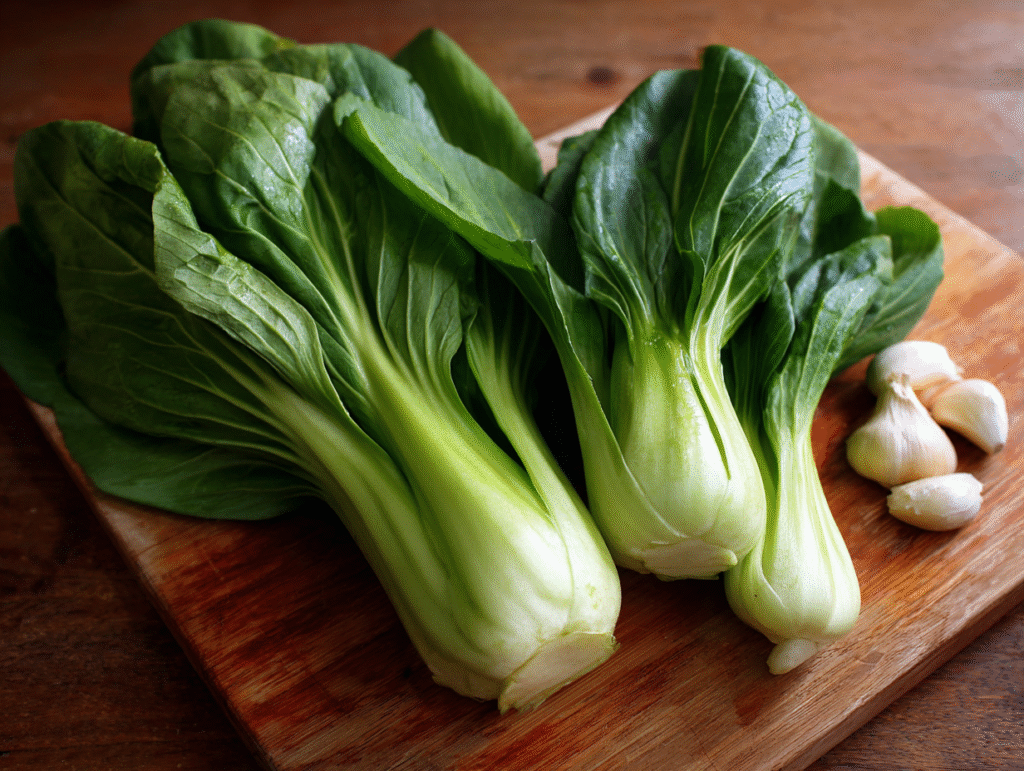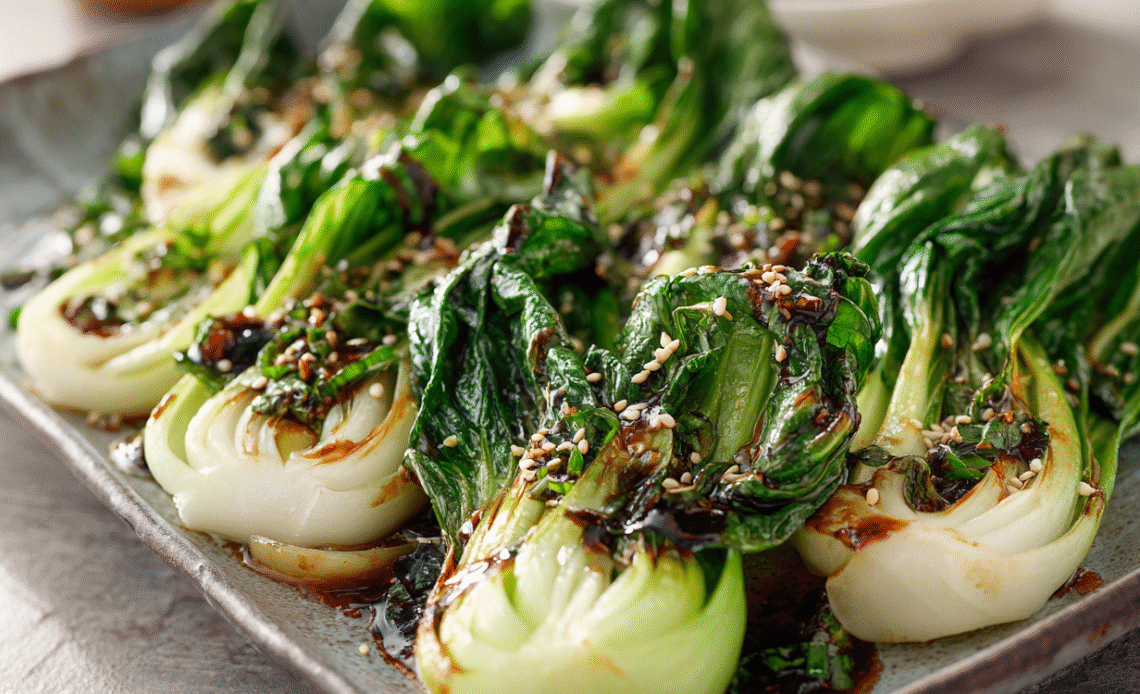Introduction
If you love discovering new and nutritious vegetables, it’s time to get to know bok choy—the crunchy, leafy green that’s stealing the spotlight in healthy kitchens worldwide. Also known as Chinese cabbage, bok choy belongs to the cruciferous vegetable family, alongside broccoli, kale, and cauliflower. This mild-tasting, versatile veggie is not only delicious but also packed with powerful nutrients that can boost your health in surprising ways.
Whether you’re sautéing, steaming, or tossing it into soups and salads, bok choy adds both flavor and nutrition to your meals. In this article, we’ll explore what makes bok choy special, its incredible health benefits, and easy ways to cook it at home.
What Exactly Is Bok Choy?
Bok choy (pronounced bahk choy) is a type of Chinese cabbage with crisp white stalks and deep green leaves. Unlike regular cabbage, it doesn’t form a head but grows in clusters similar to celery. It’s a staple ingredient in many Asian cuisines, prized for its mild, slightly peppery taste and satisfying crunch.
Fun Fact:
Bok choy has been cultivated in China for over 1,500 years and is now grown worldwide. In Mandarin, “bok choy” translates to “white vegetable.
Nutrition Facts: Why Bok Choy Is So Healthy
Bok choy is a nutrient powerhouse that delivers a big nutritional punch for very few calories.
Per 1 cup of raw bok choy (about 70 grams):
- Calories: 9
- Protein: 1 gram
- Carbohydrates: 1.5 grams
- Fiber: 1 gram
- Vitamin A: 60% of the Daily Value (DV)
- Vitamin C: 35% DV
- Vitamin K: 40% DV
- Folate: 10% DV
- Calcium: 6% DV
- Potassium: 5% DV
Key Takeaways:
- Low in calories and carbs, making it ideal for weight management and low-carb diets.
- Rich in antioxidants like beta-carotene and vitamin C.
- High in vitamin K and calcium, which support bone health.
- Contains glucosinolates, natural plant compounds that may help fight inflammation and cancer.
Top Health Benefits of Bok Choy: Get to Know Bok Choy
Let’s dive deeper into why this leafy green deserves a spot in your weekly meals.
1. Supports Immune Health
Bok choy is rich in vitamin C and beta-carotene, two powerful antioxidants that help your body fight off free radicals and strengthen your immune system.
2. Boosts Bone Strength
With its combination of calcium, magnesium, phosphorus, and vitamin K, bok choy helps maintain strong, healthy bones and reduces the risk of osteoporosis.
3. Promotes Heart Health
The potassium in bok choy supports healthy blood pressure levels, while its folate and vitamin B6 aid in breaking down homocysteine—a compound that, in excess, may harm heart health.
4. Anti-Inflammatory Properties
Bok choy contains glucosinolates and phytonutrients that reduce inflammation and may lower the risk of chronic diseases like diabetes, arthritis, and certain cancers.
5. Great for Gut Health
High in fiber and water, bok choy supports healthy digestion, regular bowel movements, and a balanced gut microbiome.

How to Cook Bok Choy (Step-by-Step Guide) Get to Know Bok Choy
One of the best things about bok choy is how easy it is to prepare. Here’s a quick step-by-step guide to help you enjoy it at home.
Step 1: Choose Fresh Bok Choy
Look for:
- Crisp, bright green leaves
- Firm, white stalks
- No yellowing or wilting
You can find two main types:
- Baby Bok Choy: Tender and sweeter, ideal for stir-fries.
- Regular Bok Choy: Larger and heartier, great for soups or grilling.
Step 2: Clean Thoroughly
Dirt often hides between the stalks. Rinse each leaf under cool water or soak the entire head in a bowl for a few minutes.
Step 3: Prep and Chop
Trim off the root end, separate the stalks, and slice into bite-size pieces. For baby bok choy, you can cook it whole or halved.
Step 4: Choose Your Cooking Method
Here are a few easy, healthy ways to cook bok choy:
1. Stir-Fry
- Heat 1 tablespoon of olive oil or sesame oil in a pan.
- Add minced garlic and ginger.
- Toss in bok choy and sauté for 3–5 minutes until tender.
- Season with soy sauce, salt, and pepper.
2. Steam
- Steam for 4–5 minutes until the leaves are wilted and stalks are tender.
- Drizzle with soy sauce or sesame oil for flavor.
3. Add to Soups or Noodles
- Drop bok choy into your favorite broth, ramen, or miso soup during the last 5 minutes of cooking.
4. Grill or Roast
- Brush with olive oil, sprinkle salt and pepper, and grill or roast at 400°F (200°C) for 10–12 minutes.
Pro Tips for Cooking with Get to Know Bok Choy
- Don’t overcook it — bok choy tastes best when the stalks stay crisp.
- Pair it with ginger, garlic, soy sauce, or chili flakes for flavor.
- Combine it with tofu, shrimp, chicken, or mushrooms for a balanced meal.
- Add it raw to smoothies or salads for an extra vitamin boost.
Why Bok Choy Deserves a Place in Your Diet – Know Bok Choy
Bok choy’s combination of crunch, mild flavor, and dense nutrition makes it an easy addition to almost any meal plan. Whether you’re following a vegan, vegetarian, low-carb, or anti-inflammatory diet, it fits right in.
Reasons to Eat More Bok Choy:
- It’s budget-friendly and widely available.
- It cooks quickly, perfect for busy weeknights.
- It supports overall wellness, from your bones to your heart.
- It’s delicious in nearly any cuisine — not just Asian dishes.

FAQs Get to Know Bok Choy
1. Is bok choy healthier than spinach?
Both are extremely nutritious. Spinach is higher in iron and magnesium, while bok choy provides more vitamin C, calcium, and vitamin K. Including both in your diet gives you the best of both worlds.
2. Can you eat bok choy raw?
Yes! Baby bok choy tastes great raw in salads, slaws, or smoothies. It has a mild, slightly sweet flavor and adds a satisfying crunch.
3. How should I store bok choy?
Wrap it in a damp paper towel and place it in a perforated plastic bag in the refrigerator. It stays fresh for up to 5 days.
4. What part of bok choy do you eat?
Both the white stalks and green leaves are edible and nutritious. The stalks stay crisp when cooked, while the leaves become tender and flavorful.
5. Is bok choy good for weight loss?
Absolutely. Bok choy is low in calories but high in fiber, making you feel full longer and supporting healthy digestion.
6. Can people with thyroid issues eat bok choy?
Like other cruciferous veggies, bok choy contains goitrogens, which can affect thyroid function in large amounts. Cooking it helps deactivate most of these compounds, making it safe for moderate consumption.
Conclusion: Get to Know Bok Choy
Bok choy isn’t just another leafy green—it’s a nutrient-rich, flavorful, and versatile vegetable that can elevate your meals and support your health. From boosting your immunity to improving digestion, its benefits are too good to ignore.
Start small by adding bok choy to your next stir-fry, soup, or salad—you’ll be surprised at how delicious and easy it is to enjoy.






